I Wake Up Streaming: November 2020
Movies
In this edition of “I Wake Up Streaming,” novelist William Boyle rounds up his top streaming picks for the month of November. The column’s name is a play on the 1941 film I Wake Up Screaming, starring Betty Grable, Victor Mature, and Carole Landis. While the film’s title hits a pleasing note of terror and despair, changing that one letter speaks to the joy of discovering new films and rediscovering old favorites, as well as the panic that comes with being overwhelmed by options.
I’ve been spending a lot of time back in the 1990s, rewatching films I first discovered on the dusty shelves of my local video store. Many of these films pop up on streaming services (especially Prime) without much warning or fanfare. My last book, City of Margins, and the new book I’m working on are set in the ’90s, which is one reason why my mind is there. It was such a formative time for me. In ’92 I graduated middle school and started high school. In ’96 I graduated high school and started college. It was when my love of film really blossomed, a decade of discovery and wonder. Another reason, I’m realizing in this stressful time, is that I go to these films as a source of comfort. There’s something in the arthouse aesthetic and approach that reminds me of what I first loved about movies, the alternate reality I could live and get lost in. The ’90s were also a profoundly rich time for independent films, for character-driven stories unafraid to challenge audiences. Audiences drawn in by the weird and the strange. Things perceived as anti-mainstream. The tone of the decade, film-wise at least, was very similar to that of the Golden Age of the ’70s. And like the ’70s, things vastly changed by the end of the decade with the advent of CGI and the beginnings of a new kind of blockbuster. Here are a handful of under-the-radar favorites that I’ve recently revisited.
My New Gun. 1992. Prime Video and Tubi.
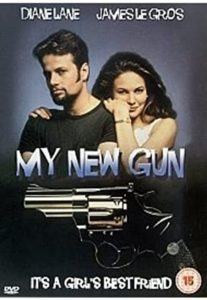 A weird one. Off-kilter and offbeat and funny. An early ’90s crime(ish) comedy that feels like a mix of Twin Peaks season 2 and the work of Hal Hartley. Diane Lane—a full decade after The Outsiders and Rumble Fish—is still so young and a truly wonderful onscreen presence. She plays Debbie, married to Gerald (a memorable performance by Stephen Collins). When they get a gun, everything goes wild. Costars ’90s stalwart James Le Gros as their neighbor Skippy in prime Le Gros mode with typical Le Gros facial hair (the same year as Singles). A super young Philip Seymour Hoffman steals the one scene he’s in. I don’t have any evidence of this, but I feel certain that Paul Thomas Anderson must’ve seen this film and known that Hoffman was his guy going forward. A low-budget, quotable debut from Stacy Cochran that deserves cult-classic status. What a strange, good time it was for movies like this.
A weird one. Off-kilter and offbeat and funny. An early ’90s crime(ish) comedy that feels like a mix of Twin Peaks season 2 and the work of Hal Hartley. Diane Lane—a full decade after The Outsiders and Rumble Fish—is still so young and a truly wonderful onscreen presence. She plays Debbie, married to Gerald (a memorable performance by Stephen Collins). When they get a gun, everything goes wild. Costars ’90s stalwart James Le Gros as their neighbor Skippy in prime Le Gros mode with typical Le Gros facial hair (the same year as Singles). A super young Philip Seymour Hoffman steals the one scene he’s in. I don’t have any evidence of this, but I feel certain that Paul Thomas Anderson must’ve seen this film and known that Hoffman was his guy going forward. A low-budget, quotable debut from Stacy Cochran that deserves cult-classic status. What a strange, good time it was for movies like this.
Mac. 1992. Prime Video.
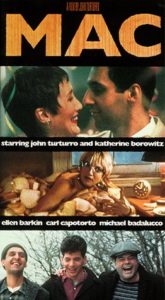
A neglected and nearly forgotten masterpiece from the early ’90s, John Turturro’s Mac—long hard to come by—is currently streaming on Prime. A beautiful film about three brothers starting their own contracting business in Queens in the early ’50s after the death of their old man. A film about family and trying to build things right. Personal, raw, loose, ambitious, and funny. Full of passion and heart. One of the great works of Italian-American art of the twentieth century. Reminiscent of the best of John Fante. Would love to see this one get the Criterion treatment.
Denial. 1990. Prime Video and Tubi.
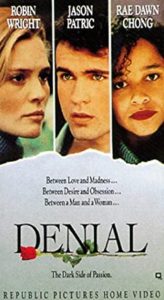 Fascinated by this movie and this director. Came to it in a roundabout way. After rewatching Frank Perry’s Doc, which Pete Hamill wrote the screenplay for, I looked at Hamill’s filmography and saw that a film had been made from one of his more famous newspaper columns, The Yellow Handkerchief. I’d somehow missed that one despite its stellar cast. The screenplay for The Yellow Handkerchief was by Erin Dignam, whom I wasn’t familiar with. Turned out she wrote and directed two films in the ’90s, Denial and Loved, both available streaming. I was drawn to Denial first by its cast (Robin Wright, Jason Patric, Rae Dawn Chong) and surprised that I’d never even heard of it. It fit the bill as a possible out-of-nowhere great film discovery. And it didn’t disappoint. I’ve seen others say that it has a kind of direct-to-video or made-for-TV quality about it. It’s low-budget, sure, but I don’t think that’s true. Not really. I watched it on Prime, and it’s clearly a bad transfer. If this was restored, I bet it’d be gorgeous. Reynaldo Villalobos shot it. I can’t find much info about Dignam. She obviously has a long-term relationship with Wright, who also stars in Loved. Dignam had a bit part in Sean Penn’s The Crossing Guard—her only acting credit. (Penn also stars in Loved, and Dignam wrote the script for The Last Face, his most recent directorial effort.) And I read somewhere that Dignam has a writing credit on Wright’s upcoming directorial debut, Land. This movie feels like a rough blueprint for Terrence Malick’s films from the 2010s, especially The Tree of Life, To the Wonder, Knight of Cups, and Song to Song. There’s a Penn connection via The Tree of Life. Could Malick have seen this during his long hiatus and been influenced by it? Does he know Dignam? I don’t know. Just speculation. Patric is very much like one of Malick’s men from that period, and he’s much more interesting to watch than, say, Ben Affleck. Again, I don’t know. Could be a stretch to suggest this, but it’s what I was thinking about. A haunting Harold Budd score. Wright is ethereal, gorgeous. It’s possibly my favorite performance of hers. I encountered one piece of secondhand evidence that suggested she believes this to be her best film. She is perfect doing all of the very Malick-y things she does: standing and watching, running around, playing, just sitting introspectively, breaking down. Denial is a memory piece and a poem (both things that are true of late-period Malick, as well). Don’t go in expecting an erotic thriller or something, though there are moments where it tonally resembles that. I love the structure—the simultaneity of past and present. Wright’s character, Sara/Loon, is haunted by a relationship with Patric’s brooding, abusive Michael. The threads of the story meet on the bridge of memory. The poster’s truly terrible. I have to imagine they didn’t know how to market this. No doubt Dignam’s career was derailed by the sexism of the industry. Her follow-up, Loved, is also masterful, but I bet she wouldn’t have even had the chance to make it if not for Wright’s ’90s star power. This really deserves a good restoration.
Fascinated by this movie and this director. Came to it in a roundabout way. After rewatching Frank Perry’s Doc, which Pete Hamill wrote the screenplay for, I looked at Hamill’s filmography and saw that a film had been made from one of his more famous newspaper columns, The Yellow Handkerchief. I’d somehow missed that one despite its stellar cast. The screenplay for The Yellow Handkerchief was by Erin Dignam, whom I wasn’t familiar with. Turned out she wrote and directed two films in the ’90s, Denial and Loved, both available streaming. I was drawn to Denial first by its cast (Robin Wright, Jason Patric, Rae Dawn Chong) and surprised that I’d never even heard of it. It fit the bill as a possible out-of-nowhere great film discovery. And it didn’t disappoint. I’ve seen others say that it has a kind of direct-to-video or made-for-TV quality about it. It’s low-budget, sure, but I don’t think that’s true. Not really. I watched it on Prime, and it’s clearly a bad transfer. If this was restored, I bet it’d be gorgeous. Reynaldo Villalobos shot it. I can’t find much info about Dignam. She obviously has a long-term relationship with Wright, who also stars in Loved. Dignam had a bit part in Sean Penn’s The Crossing Guard—her only acting credit. (Penn also stars in Loved, and Dignam wrote the script for The Last Face, his most recent directorial effort.) And I read somewhere that Dignam has a writing credit on Wright’s upcoming directorial debut, Land. This movie feels like a rough blueprint for Terrence Malick’s films from the 2010s, especially The Tree of Life, To the Wonder, Knight of Cups, and Song to Song. There’s a Penn connection via The Tree of Life. Could Malick have seen this during his long hiatus and been influenced by it? Does he know Dignam? I don’t know. Just speculation. Patric is very much like one of Malick’s men from that period, and he’s much more interesting to watch than, say, Ben Affleck. Again, I don’t know. Could be a stretch to suggest this, but it’s what I was thinking about. A haunting Harold Budd score. Wright is ethereal, gorgeous. It’s possibly my favorite performance of hers. I encountered one piece of secondhand evidence that suggested she believes this to be her best film. She is perfect doing all of the very Malick-y things she does: standing and watching, running around, playing, just sitting introspectively, breaking down. Denial is a memory piece and a poem (both things that are true of late-period Malick, as well). Don’t go in expecting an erotic thriller or something, though there are moments where it tonally resembles that. I love the structure—the simultaneity of past and present. Wright’s character, Sara/Loon, is haunted by a relationship with Patric’s brooding, abusive Michael. The threads of the story meet on the bridge of memory. The poster’s truly terrible. I have to imagine they didn’t know how to market this. No doubt Dignam’s career was derailed by the sexism of the industry. Her follow-up, Loved, is also masterful, but I bet she wouldn’t have even had the chance to make it if not for Wright’s ’90s star power. This really deserves a good restoration.
Montana. 1998. Prime Video.
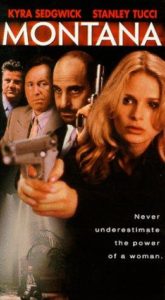 The only feature directed by Jennifer Leitzes. Hits some unusual beats and turns things around in a refreshing way. A hell of a cast. Kyra Sedgwick and Stanley Tucci have fun with their roles as gangsters. Robin Tunney is lovely in a mostly thankless role. Philip Seymour Hoffman chews some scenery in his limited time onscreen—another good (and little-known) early turn from Hoffman. John Ritter is good as a Willefordian villain. All in all, an underrated B noir debut. On paper, it’s got pretty much everything I want, and—while it’s far from perfect—it certainly doesn’t disappoint. Wish it had been just the beginning of Leitzes’s career instead of the beginning and the end.
The only feature directed by Jennifer Leitzes. Hits some unusual beats and turns things around in a refreshing way. A hell of a cast. Kyra Sedgwick and Stanley Tucci have fun with their roles as gangsters. Robin Tunney is lovely in a mostly thankless role. Philip Seymour Hoffman chews some scenery in his limited time onscreen—another good (and little-known) early turn from Hoffman. John Ritter is good as a Willefordian villain. All in all, an underrated B noir debut. On paper, it’s got pretty much everything I want, and—while it’s far from perfect—it certainly doesn’t disappoint. Wish it had been just the beginning of Leitzes’s career instead of the beginning and the end.
River of Grass. 1994. Prime Video and Kanopy.
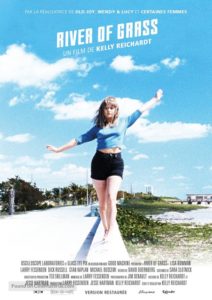
From the use of voiceover to some visual echoes, Kelly Reichardt’s 1994 debut owes an obvious debt to Terrence Malick’s Badlands. But Lisa Bowman’s Cozy is much older than Sissy Spacek’s Holly and Larry Fessenden’s Lee Ray Harold is the polar opposite of Martin Sheen’s Kit. There are major differences beyond that, too. The crime that makes Cozy and Lee impromptu outlaws isn’t much of a crime and their meanderings don’t take them very far. The worst thing they do is shoot a palmetto bug. River of Grass is slim and economical and a quietly funny film, a grimy Florida noir way more interested in untangling the lives of its desperate characters than in twisty plotting. It only hints at the greatness to come in Reichardt’s filmography, as she seems to be finding her voice, but it has the energy and enthusiasm that only a first film can deliver.
Gas Food Lodging. 1992. Prime Video.
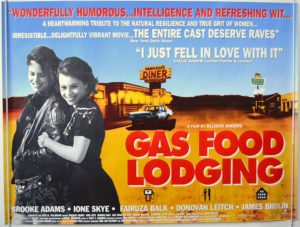
Allison Anders’s Gas Food Lodging has long been one of my favorite films. I’m not sure that it can be perceived as under the radar (it’s a classic in my book), but it is a film that until recently hasn’t been widely available. First, an Arrow Blu-ray was released a couple of years back and then it ran briefly on the Criterion Channel and now it’s on Prime. Before that, though, it was fairly hard to see for a good stretch of time. For folks of my generation, this one looms large. The J Mascis score. Fairuza Balk and Ione Skye giving all-timer performances as sisters Shade and Trudi. The desert setting. The diners and gas stations. The (fictional) Mexican melodramas that Shade sneaks off to see. One of the greatest uses of voiceover this side of Badlands and Days of Heaven. There’s so much to love here. It’s a tender and yet sharp coming-of-age story. While Shade’s the character we’re with the most, Skye’s Trudi is complex and multidimensional, coming off first as racist and unlikable and then opening herself up to the first decent guy she meets, revealing a life shaped by trauma. Features one of my favorite scenes in anything: Shade and her AWOL old man John (played with a sort of savage kindness by James Brolin) talking in his truck. Great supporting turns by Brooke Adams, Jacob Vargas, and others, including a cameo from J Mascis near the end. I love this movie so much.
Motorama. 1991. Prime Video and Tubi.
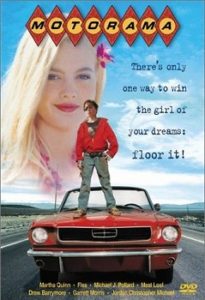
A strange little film written by Joseph Minion, writer of Scorsese’s After Hours. A ten-year-old boy, fed up with his abusive parents, hits the road in a stolen Mustang. He rides through a surreal America, playing a kind of Monopoly gas station game called “Motorama.” He has various encounters along the way, trying desperately to solve the riddle of the game. It feels like a children’s movie, but it’s decidedly not. It’s a rough-edged, dark journey into a kind of dystopian wasteland. To its great credit, it’s truly weird without trying too hard to be weird. This isn’t some mere David Lynch rip-off, the kind that ran rampant in the wake of the massive success of Twin Peaks. Definitely a close descendant of After Hours and would double nicely with it.
The Dark Backward. 1991. Prime Video.
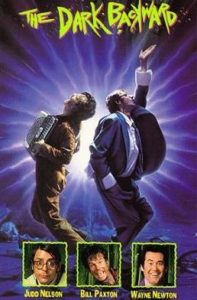 If you’ve never heard of this film, I’m not sure I can explain it in a way that will make you believe it’s actually real. Judd Nelson plays Marty Malt, an aspiring standup comedian whose day job is as a garbage man. Bill Paxton is his buggy sidekick, Gus, another garbage man who eats garbage and seems to be perpetually filthy. It’s an unhinged and wildly fun performance, one of Paxton’s best. When Gus finds a dead body in the dump, you might be tempted to believe a mystery is unfolding. It’s not. Gus simply licks the body and covers it up with trash. Instead, what happens is that Marty begins to grow a lump on his back. He visits Dr. Scurvy, played with devious joy by James Caan, who tells him it’s nothing. But it’s something. A third arm grows from his back. At first, it’s the size of a baby’s arm but then it’s a full-blown adult male arm, just dangling there. Gus sees it as an opportunity to get Marty’s act off the ground. Freaks sell. Talent agent Jackie Chrome (Wayne Newton!) sees something special, and Marty’s career does take off. Lara Flynn Boyle is somber and terrific as Rosarita, Marty’s girlfriend, and it’s wonderful to see Rob Lowe pop in as Dirk Delta, riffing on Willem Dafoe’s Bobby Peru from David Lynch’s Wild At Heart. Obviously influenced by John Waters and an obvious influence on almost everything Tim Heidecker and Eric Wareheim have ever done (as well as Malt being the clear model for Neil Hamburger’s whole act), The Dark Backward won’t leave your imagination any time soon. Films like The Greasy Strangler and An Evening with Beverly Luff Lin are gunning for what Adam Rifkin accomplished here. I rewatched it on election night, and it was a good, weird world to get lost in for a while.
If you’ve never heard of this film, I’m not sure I can explain it in a way that will make you believe it’s actually real. Judd Nelson plays Marty Malt, an aspiring standup comedian whose day job is as a garbage man. Bill Paxton is his buggy sidekick, Gus, another garbage man who eats garbage and seems to be perpetually filthy. It’s an unhinged and wildly fun performance, one of Paxton’s best. When Gus finds a dead body in the dump, you might be tempted to believe a mystery is unfolding. It’s not. Gus simply licks the body and covers it up with trash. Instead, what happens is that Marty begins to grow a lump on his back. He visits Dr. Scurvy, played with devious joy by James Caan, who tells him it’s nothing. But it’s something. A third arm grows from his back. At first, it’s the size of a baby’s arm but then it’s a full-blown adult male arm, just dangling there. Gus sees it as an opportunity to get Marty’s act off the ground. Freaks sell. Talent agent Jackie Chrome (Wayne Newton!) sees something special, and Marty’s career does take off. Lara Flynn Boyle is somber and terrific as Rosarita, Marty’s girlfriend, and it’s wonderful to see Rob Lowe pop in as Dirk Delta, riffing on Willem Dafoe’s Bobby Peru from David Lynch’s Wild At Heart. Obviously influenced by John Waters and an obvious influence on almost everything Tim Heidecker and Eric Wareheim have ever done (as well as Malt being the clear model for Neil Hamburger’s whole act), The Dark Backward won’t leave your imagination any time soon. Films like The Greasy Strangler and An Evening with Beverly Luff Lin are gunning for what Adam Rifkin accomplished here. I rewatched it on election night, and it was a good, weird world to get lost in for a while.
William Boyle is the author of the novels Gravesend, The Lonely Witness, A Friend Is a Gift You Give Yourself, and City of Margins, and a story collection, Death Don’t Have No Mercy. His novella Everything Is Broken was published in Southwest Review Volume 104, numbers 1–4. His writing on film has appeared in Oxford American and CrimeReads. He used to have a blog about ’70s crime films called Goodbye Like a Bullet. His website is williammichaelboyle.com.
More Movies


